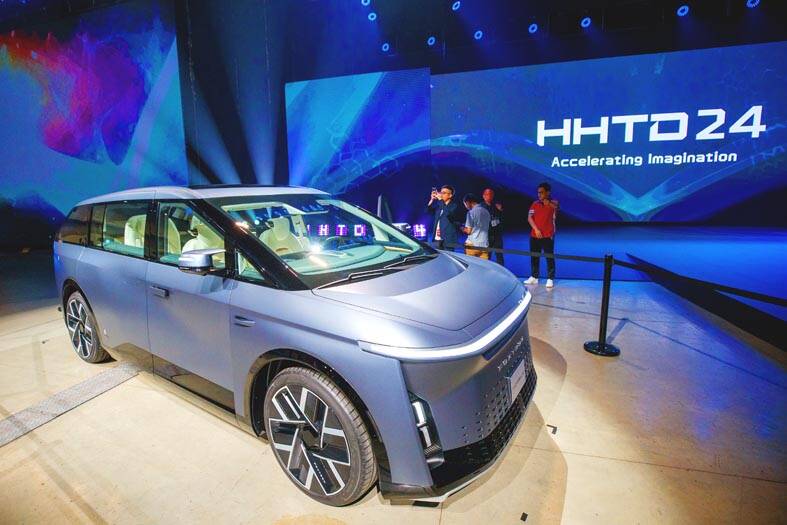Hon Hai Precision Industry Co (鴻海精密) has secured an agreement to make Mitsubishi Motors Corp electric vehicles (EV), scoring the first major customer for its fledging EV contract manufacturing business.
Hon Hai would begin building vehicles for Mitsubishi in Taiwan, a person familiar with the matter said.
It was unclear when production would actually start, but the first vehicles to roll off the assembly line would target Australia and New Zealand, the person said, asking to remain anonymous discussing a non-public matter.

Photo: Ritchie B. Tongo, EPA-EFE
Hon Hai representatives declined to comment on Thursday, while a Mitsubishi spokesperson said the automaker is always open to collaboration.
Hon Hai, known also as Foxconn, is trying to develop businesses from artificial intelligence (AI) servers to EV outsourcing to reduce its reliance on iPhones and consumer electronics.
However, it has made little headway on plans to assemble cars for the world’s biggest auto names, much as it does for smartphone and computer brands. It has introduced several model vehicles to show off its design and production capabilities.
However, building up the automotive arm would take years, Hon Hai’s EV business chief Jun Seki told Bloomberg TV in an interview in October last year.
Hon Hai has previously engaged in discussions to buy a slice of Nissan Motor Co, Mitsubishi Motors’ largest shareholder, to further its own ambitions.
Hon Hai chairman Young Liu (劉揚偉) told analysts on an earnings call last week that he expected to sign an auto contract with a Japanese client within months.
Last month, Liu also said that the company approached Nissan and Honda Motor Co about potential cooperation.
The news about Mitsubishi was first reported by Kyodo News.
Hon Hai’s potential deal to produce outsourced EVs for Mitsubishi Motors could advance its automotive ambitions by building credentials in vehicle manufacturing via an alliance with an established Japanese brand, analysts Steven Tseng (曾緒良) and Sean Chen said.
This could potentially pave the way for future pacts, they added.
Mitsubishi last year ranked as Japan’s eighth-largest automaker, with Nissan as its largest shareholder.

Sweeping policy changes under US Secretary of Health and Human Services Robert F. Kennedy Jr are having a chilling effect on vaccine makers as anti-vaccine rhetoric has turned into concrete changes in inoculation schedules and recommendations, investors and executives said. The administration of US President Donald Trump has in the past year upended vaccine recommendations, with the country last month ending its longstanding guidance that all children receive inoculations against flu, hepatitis A and other diseases. The unprecedented changes have led to diminished vaccine usage, hurt the investment case for some biotechs, and created a drag that would likely dent revenues and

Macronix International Co (旺宏), the world’s biggest NOR flash memory supplier, yesterday said it would spend NT$22 billion (US$699.1 million) on capacity expansion this year to increase its production of mid-to-low-density memory chips as the world’s major memorychip suppliers are phasing out the market. The company said its planned capital expenditures are about 11 times higher than the NT$1.8 billion it spent on new facilities and equipment last year. A majority of this year’s outlay would be allocated to step up capacity of multi-level cell (MLC) NAND flash memory chips, which are used in embedded multimedia cards (eMMC), a managed

CULPRITS: Factors that affected the slip included falling global crude oil prices, wait-and-see consumer attitudes due to US tariffs and a different Lunar New Year holiday schedule Taiwan’s retail sales ended a nine-year growth streak last year, slipping 0.2 percent from a year earlier as uncertainty over US tariff policies affected demand for durable goods, data released on Friday by the Ministry of Economic Affairs showed. Last year’s retail sales totaled NT$4.84 trillion (US$153.27 billion), down about NT$9.5 billion, or 0.2 percent, from 2024. Despite the decline, the figure was still the second-highest annual sales total on record. Ministry statistics department deputy head Chen Yu-fang (陳玉芳) said sales of cars, motorcycles and related products, which accounted for 17.4 percent of total retail rales last year, fell NT$68.1 billion, or

In the wake of strong global demand for AI applications, Taiwan’s export-oriented economy accelerated with the composite index of economic indicators flashing the first “red” light in December for one year, indicating the economy is in booming mode, the National Development Council (NDC) said yesterday. Moreover, the index of leading indicators, which gauges the potential state of the economy over the next six months, also moved higher in December amid growing optimism over the outlook, the NDC said. In December, the index of economic indicators rose one point from a month earlier to 38, at the lower end of the “red” light.